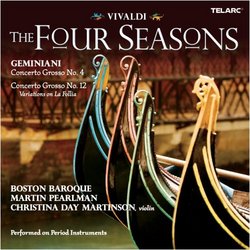Album DescriptionThe Four Seasons, one of the most famous pieces of classical music, circulated widely in Vivaldi's time. Years later, though, it fell out of the repertoire for over a century before being "rediscovered" in the first part of the 20th century. First published in Amsterdam in 1725, The Four Seasons are the first four of a set of twelve concertos with the overall title Il cimento dell'armonia e dell'inventione (The contest between harmony and invention), Op. 8.The original publication that included The Four Seasons provided a sonnet (possibly by Vivaldi himself) giving a detailed program for each of the four concertos, and indicating pictorial effects in greater detail than any other work of Vivaldi. These include bird calls; angry tremolos designated as "thunder;" gentle dotted rhythms marked "the murmuring of the fronds and plants"; the viola as "barking dog;" a pastoral dance with the sound of bagpipes; the voice of the cuckoo and the turtle dove; a furious summer storm; a depiction of "drunks;" an imitation of horn calls in "the hunt;" the shiver of Winter, with its blasts of wind and chattering of teeth, sliding on the ice, falling as it cracks, and the joy of resting peacefully by the fireside. Too many to name here, they are all spelled out in the sonnets and notes that accompany the CD.Why The Four Seasons? The only possible reason to record another version of The Four Seasons is to introduce a new, astonishingly talented young baroque violinist to the musical public. Even then, the soloist should have the one-of-a-kind support that comes only from a world-class period-instrument orchestra and conductor, as well as the sonics of a world-class recording team. The stunning new young soloist is Christina Day Martinson, a native of Saskatchewan, Canada, and twice a National Finalist and prize-winner in the Canadian Music Competition. Ms. Day Martinson performs regularly as soloist, concertmaster and orchestra member with Boston Baroque, and she has appeared as concerto soloist with Tempesta di Mare, UNICAMP Symphony Orchestra in Brazil, and Amsterdam's Symphony Orkest Mozart.

